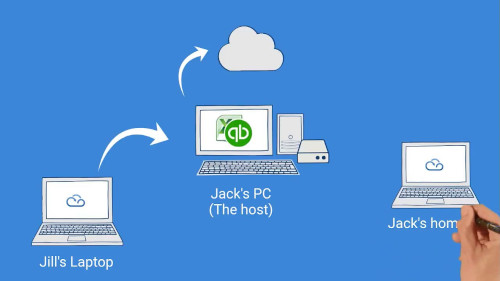Understandably the threat of a global health emergency is frightening. With the continuing spread of those affected by the coronavirus, the need for the public to protect their health is paramount. This need for protection extends to the business world, where now more than ever employers are faced with a decision – to protect the health of their workforce, while ensuring business continuity during a global health pandemic.
As the threat of the virus continues to affect those around the world, the question is, will the work environment become a health hazard? With open offices, co-working spaces, frequent interaction in work environments and daily work commutes, going to work could put workers at risk to a hotbed of contagious infections.
Is it a wonder that remote work has seen significant boost since the outbreak? Before we look into what CNN have labelled as the biggest “work from home experiment” triggered by the coronavirus, let’s look find out a little bit more about the coronavirus and its impact thus far.
What is Coronavirus?
Coronavirus (CoV) belongs to the family of a specific virus that give rise to mild diseases like influenza to more intense illnesses, such as the SARS-CoV (Severe Acute Respiratory Syndrome).
The virus is also known as the ‘novel coronavirus’ (2019-nCoV) by the World Health Organization (WHO). Publicly it is known as COVID 2019 or simply the ‘coronavirus’.
Previously unknown, the virus is a fresh strain, and was first recorded in Wuhan, China on December 31st, 2019.
The coronavirus attacks the respiratory system, causing pneumonia, kidney failure, and even death. Despite other similar viruses, which are transferred from animals to humans, the coronavirus is transmitted from person-to-person.
Since the outbreak, WHO have been working tirelessly to educate the public with prevention measures.
Typical symptoms of coronavirus can include coughing, a fever and struggling to breath. Although, extremely rare, for those who contract the virus, and are of old age or have additional underlying health problems, the virus could lead to death.
It is advised that you speak to a doctor if you experience any of the above systems or have been exposed to someone who is carrying the virus. If you have recently traveled internationally, you should call your doctor, to disclose your systems to him/her before you go to your appointment.
The Impact of Coronavirus
As it stands at least 67,000 people in mostly mainland China have been infected by the coronavirus. On Saturday 15th February, the death toll had exceeded 1,500. As are result, this has forced many companies in China to shut down their operations. With those that have remained open have changed their work environment, by implementing policies and safeguards.
An example of this is Huawei (the country’s top smartphone maker), where employees are now required to provide information about their body temperature, and detail their whereabouts weekly. Hand sanitizers and face masks are dispensed all over campus.
Firms like DiDi, Alibaba, Audi China, Microsoft, just to name a few, have however, made the decision to enforce a remote working policy to avoid minimal risk as possible.
Likewise, several US states are now paying attention to remote working ethics, as 19 positive coronavirus cases have been identified in different states including Texas, Washington, Arizona, and California.
Along with the US, it appears the virus has also spread to different international locations, including Taiwan, India, the Philippines, United Kingdom. This factor has altered many traditional business structures. Therefore, many global companies are finding work from home strategies as the more effective alternative to continue business as usual – despite the circumstances they face themselves in.
US Cities and States Supporting Remote Work
Fear of the coronavirus is driving more employees to work from home. According to a study by Overhead on Conference Calls, which looked at the best US cities for remote work The study gives each city a living and work factors rank (between 1-50, the lower the number the higher the score) based on the cost of living, commute time savings, Wi-Fi speed, number of coffee shops, and number of coworking spaces. Here are the best US cities for remote work according to the findings.
-
- Kansas City, Missouri
- Salt Lake City, Utah
- Austin, Texas
- Rayleigh , North Carolina
- San Antonio, Texas
- Denver, Colorado
- Atalanta, Georgia
- Richmond, Virginia
- Dallas, Texas
- Las Vegas, Nevada
- Charlotte, North Carolina
- Miami, Florida
- Boston, Massachusetts
- Virginia Beach, Virginia
- St Louis, Missouri
Global Cities Encouraging Remote Work during the Epidemic
Some of the international cities promoting work from home culture for employees to prevent them from coronavirus include:
Is Remote Work the Future?
For employers the benefits of remote work include:
- Minimum Operational Cost
The annual expense for an office space for each worker is around $9,000 to $18,000, which is reduced because of remote working.
- Enhanced Productivity
Workers don’t lose their energy on a commute that helps them to be more creative and responsible for their tasks. Furthermore, work from home provides satisfaction to the teams. These facts ultimately bring more profits on the table.
- Maximum Corporate Social Responsibility
Remote working promotes a pollution-free environment that helps employers to maintain a respectable position of the organization in the social sphere.
- Global Hiring Opportunities
Businesses involved in remote work have the opportunity to hire experts from different parts of the world. So with time, the remote-first organizations become competitive as compared to the office-first companies.
Remote Work Benefits for Employees
So far the only way to ensure employee’s’ health and safety in the current climate is to facilitate them for remote working. Luckily technology advancements have made working from home more accessible and just as productive. Benefits for employees include:
- Maximum Control
Remote working allows you to have more control over your tasks. This means you can work at the times you are most productive.
- Better health / work balance
Remote work allows you to spend more time with the family. Avoid the daily commute which can take its toll on your mental health. Working remotely means you can make time to go to the gym.
- Zero Traveling / costs saved
Remote work means you no longer will have to take the dreaded daily and tiresome commute to work, which can take its toll on you mentally. Both time and expenses are saved.
- Less health risks
With the coronavirus in full effect, working from home, means minimum human interaction, which significantly reduces your risk of contamination.
- Better productivity
For many people, working from home means better productivity. Not being distracted by colleagues, reducing the amount of meetings helps you to remain focused.
- Pollution is reduced
If you care about climate change, then remote working, means a reduction in the number of cars / transport on the road.
- Lower cost of living
Working from home means you can work anywhere in the world. This means you could work in a location where living costs are a lot cheaper.
If you’re a company thinking about remote work for your team, MyQuickCloud is the remote desktop software that allows multiple, simultaneous users to access computers and desktop applications from anywhere.
Whether you need to access your computer remotely, share your desktop software with clients and colleagues, or take one of our cloud servers; our easy to use application will have you, your colleagues and your clients all working together seamlessly.





